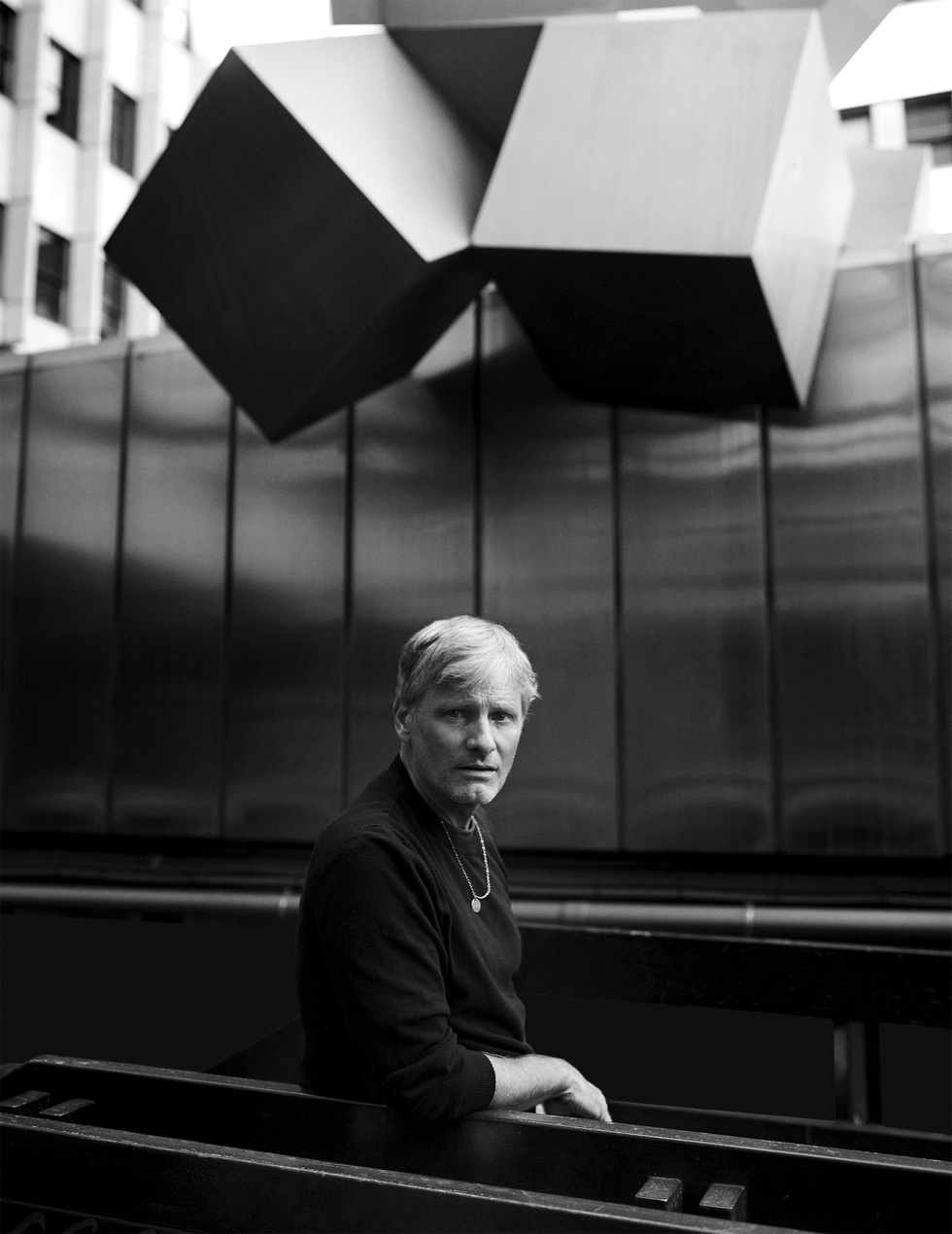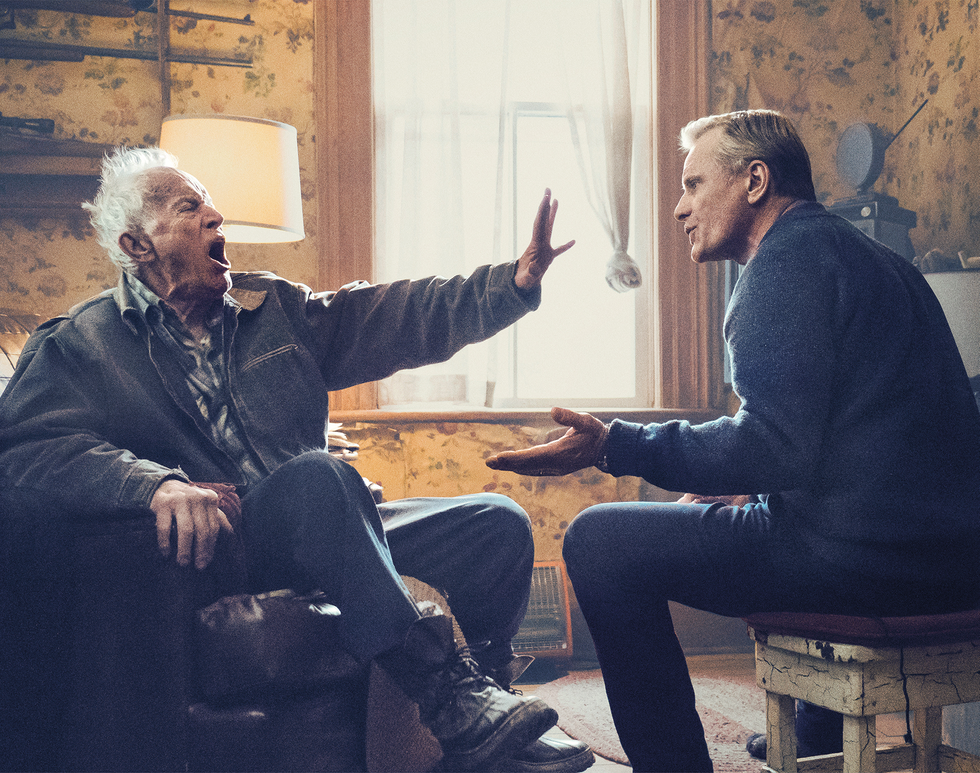On a transatlantic night-flight six years ago, the Danish-American actor Viggo Mortensen took out his notebook and started to write a short story. He was returning home from his mother’s funeral in upstate New York; there, he had been struck by the subtle ways in which different people’s recollections of her diverged.
“I found it interesting that the same story, told by each person, was slightly different,” he says. “It proved that memory is subjective.”
A few days later, he returned to the short story, somewhat hesitantly. “I didn’t expect much. I thought it could be like when you wake up in the middle of the night with an idea and you write it down, and when you read it the next day you go, ‘That’s shit.’” But he was pleasantly surprised by what he found: the story of a dyspeptic old man with early onset dementia who moves in with his grown-up son’s family in LA. Within a few weeks he had written the basic screenplay that would become his debut feature film, Falling.
For Mortensen, Falling is a personal project and then some. He wrote, directed, produced — and composed the score. He also stars as the middle-aged son, John, opposite Lance Henriksen as the ailing father, Willis. Speaking to Esquire on a video call from the home in Madrid he shares with his partner, the actress Ariadna Gil, Mortensen — clean shaven, black shirt, flash of a silver chain — is in exceptional shape for his 61 years. He’s an actor who’s known for his committed performances — when he was shooting the 2009 adaptation of Cormac McCarthy’s post-apocalyptic novel The Road, he is reported to have slept outside and insisted on having wet shoes — but as the sun finds the gaps in the closed window-shutters behind him, he talks with a fervour that’s notable even by those standards.
Falling is an affecting, tender, at times upsetting, portrait of a testing relationship between father and son made more difficult by a cruel disease. While Mortensen is keen to emphasise the creative license that separates John and Willis’s story from his own — “by making it a fictional family I felt I was getting closer to what I felt about my parents” — it’s impossible not to see parallels to his own life: both his parents suffered from dementia and he says he had “a very hands-on experience” caring for them before they died. However, he does admit one of the film’s memorable scenes, in which a four-year-old boy on a hunting trip with his father, first shoots a duck, and then insists on bathing and sleeping with its corpse, was something that he did: “The landscapes were different but it was basically the same thing.”
Mortensen, who was born in New York but spent time as a boy living in Argentina and Venezuela, has always been an unusual Hollywood proposition. He has starred in three edgy films for David Cronenberg (A History of Violence, Eastern Promises, for which he received a best actor Oscar nomination, and A Dangerous Method), but he’s also played the hunky Aragorn in The Lord of the Rings trilogy, and mouthy chauffeur Tony Lip in Green Book, for which he received his third best actor nomination; he received another in 2016 for playing an eccentric widower in Captain Fantastic. Yet directing is an entirely different beast.
“I wasn’t any more nervous on my first day directing; just like acting, I didn’t sleep the night before,” he says. “But because I had been sort of a nosy actor, I’ve always asked questions of directors when they would allow it. I’ve always been interested in the collective effort that goes into getting a story effectively told on screen. The big difference was now I was being asked the questions and I had to have the answers right then, even if it was, ‘I’m not sure but let’s try this’. It didn’t bother me. I liked it.”
It was from Cronenberg above all, he says, that he learned “there’s no such thing as preparing too much or too early for a shoot”. He was even able to offer the director of Naked Lunch and The Fly a small part in Falling. Cronenberg plays a doctor called upon to perform a rectal examination. “I didn’t ask as a favour,” says Mortensen. “I said, ‘Look, I’m going to shoot this movie in Toronto where you live, and there’s a scene I think you’d be great for. Fortunately, he read it and he liked it. If you’re not a cinephile maybe you don’t know what he looks like, you just think, ‘That actor’s really good’. If you do know him, I suppose there’s an added, ‘Oh! It’s him!’
“I don’t know if I’d want Cronenberg, with the visual associations I have with his work, to be my proctologist…” he laughs. “But it was fun.”
Falling is out now
Like this article? Sign up to our newsletter to get more articles like this delivered straight to your inbox
Need some positivity right now? Subscribe to Esquire now for a hit of style, fitness, culture and advice from the experts

Miranda Collinge is the Deputy Editor of Esquire, overseeing editorial commissioning for the brand. With a background in arts and entertainment journalism, she also writes widely herself, on topics ranging from Instagram fish to psychedelic supper clubs, and has written numerous cover profiles for the magazine including Cillian Murphy, Rami Malek and Tom Hardy.














